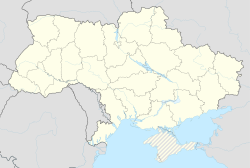Lugansk, Ukraine
|
Luhansk / Lugansk Луганськ / Луганск |
|||
|---|---|---|---|

Hotel Ukraine, architect Joseph Karakis
|
|||
|
|||
| Location of Luhansk | |||
| Coordinates: 48°34′0″N 39°20′0″E / 48.56667°N 39.33333°E | |||
| Country |
|
||
| Oblast | Luhansk Oblast | ||
| Founded | 1795 | ||
| Area | |||
| • Total | 257 km2 (99 sq mi) | ||
| Elevation | 105 m (344 ft) | ||
| Population (2013) | |||
| • Total | 425,848 | ||
| • Density | 1,802/km2 (4,670/sq mi) | ||
| Postal code | 91000 | ||
| Area code(s) | +380 642 | ||
| Climate | Dfa | ||
| Website | http://gorod-lugansk.com/ | ||
Coordinates: 48°34′N 39°18′E / 48.567°N 39.300°E
Luhansk (Ukrainian: Луганськ, IPA: [luˈɦɑnʲsʲk]) or Lugansk (Russian: Луганск; IPA: [lʊˈgansk]), formerly known as Voroshilovgrad (1935-1958 and 1970-1990) is a city in the easternmost Ukraine.
Luhansk has been held by the rebel group of Luhansk People's Republic since 2014. Luhansk is the administrative center of the Luhansk Oblast. After the rebels captured Luhansk and the southern parts of the Oblast, the (pro-Kiev) administration moved to Sievierodonetsk.
The city traces its history to 1795 when the British industrialist Charles Gascoigne founded a metal factory near the Zaporizhian Cossacks settlement Kamianyi Brid. The settlement around the factory was known as Luganskiy Zavod. In 1882 the factory settlement Luganskiy Zavod was merged with the town of Kamianyi Brid into the city of Luhansk. Located in the Donets Basin, Luhansk developed into an important industrial center of Eastern Europe, particularly as a home to the major locomotive-building company Luhanskteplovoz. The city was occupied by Nazi Germany between July 14, 1942 and February 14, 1943.
...
Wikipedia



